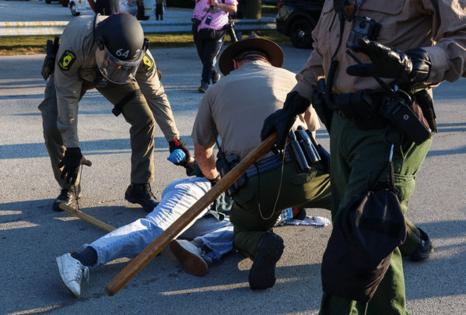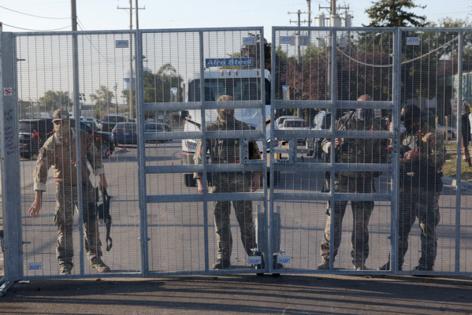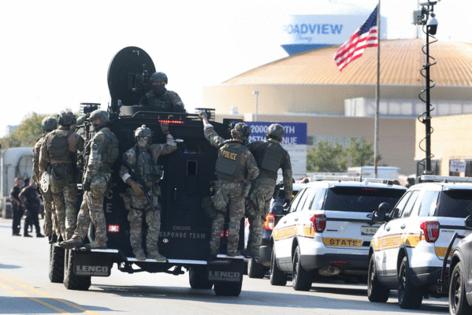National Guard deployment moves ahead in Illinois after judge declines state's suit to block Trump call-up
Published in News & Features
CHICAGO — Hundreds of National Guard troops could be deployed in the Chicago region as soon as Tuesday after a federal judge declined to issue an immediate order blocking President Donald Trump’s moves to activate Guard members over the objections of Illinois Gov. JB Pritzker and scores of local officials.
The decision from U.S. District Judge April Perry, over strenuous objections from the Illinois attorney general’s office, came in a hearing hours after the state and the city of Chicago filed a lawsuit Monday morning seeking to prevent the use of Guard forces from Illinois and Texas for what the White House claims is an effort to protect federal immigration personnel and facilities amid the Trump administration’s escalated deportation actions.
Attorneys for the federal government said during a brief court hearing Monday afternoon that Texas National Guard units were in transit to Illinois and weren’t expected to “begin getting into position to perform federal protective missions until tomorrow at the earliest.” Illinois Guard members have been ordered to report Tuesday. The federal government is uncertain when it will be ready for its “federal protective mission,” Trump administration attorneys told Perry.
The Trump administration’s Defense Department has moved in recent days to federalize 300 members of the Illinois National Guard, despite Pritzker’s opposition, as well as 400 Guard members from Texas. Approximately half of the Guard members from Texas are expected to be sent to Illinois, with the support of Texas Republican Gov. Greg Abbott.
Absent a legal order blocking their deployment, like the ones a federal judge in Oregon issued over the weekend barring the federalization of Guard troops from that state or any other, it wasn’t clear what more Illinois officials could do to shield the state from the incursion. Pritzker has long said that the law would be on the state’s side in deterring such a deployment, but as of late Monday, it appeared that the troops would arrive in Illinois before a court intervened.
While Perry, whom Democratic President Joe Biden appointed to the bench, said she was “very troubled” by the Trump administration’s inability to answer questions, such as where in Illinois the Guard members would be sent, she said she was not able to rule on the state’s request to temporarily block the deployment without first reading the voluminous court filings. Perry gave the Trump administration until midnight Wednesday to respond to the state’s arguments.
Illinois Attorney General Kwame Raoul during a news conference Monday, which was held at the same time as the federal court hearing, said his office moved as swiftly as possible to bring the state’s case against Trump.
“I’ve known of talk of the Illinois National Guard for weeks, but it was not ripe for filing,” he said, saying that over the weekend the situation was in flux.
“Facts evolve, and so we filed a lawsuit not in a rush to just say that we’re responding but we work hard to make sure it’s right — it’s right by the law. It’s right by the facts,” Raoul said. “I don’t want to file a lawsuit that’s merely dismissed because it’s not ripe for filing.”
Still, in court, the state argued for the importance of immediately blocking a deployment — which could last at least 60 days, according to federal documents — before the arrival of troops.
“When they set foot here, the sovereign injury grows only greater,” said Christopher Wells, public interest division chief with the Illinois attorney general’s office. “That is the urgency. ... We believe the (temporary restraining order) must happen right now. If there are troops in transit, they must go home right now.”
Pritzker continued his full-throated opposition to Trump’s proposed use of military troops in the state.
“There is no invasion here. There is no insurrection here. Local and state law enforcement are on the job and managing what they need to,” Pritzker said. “Donald Trump is using our service members as political props and as pawns in his illegal effort to militarize our nation’s cities.”
Speaking to reporters in the Oval Office on Monday, Trump suggested he could invoke the Insurrection Act if needed to sidestep court orders or uncooperative officials.
“If I had to enact it, I’d do it, if people were being killed and courts were holding us up, or governors or mayors were holding us up,” he said.
In its 69-page filing, Raoul’s office asked the federal court to find the federalization and deployment of National Guard troops unconstitutional and to block Defense Secretary Pete Hegseth from deploying troops to the state over Pritzker’s objections. Late Sunday, Hegseth authorized sending 400 National Guard troops from Texas to Illinois, Oregon and potentially other states.
“The Trump administration’s illegal actions already have subjected and are subjecting Illinois to serious and irreparable harm. The deployment of federalized National Guard, including from another state, infringes on Illinois’s sovereignty and right to self-governance,” the filing stated. “It will cause only more unrest, including harming social fabric and community relations and increasing the mistrust of police. It also creates economic harm, depressing business activities and tourism that not only hurt Illinoisans but also hurt Illinois’s tax revenue.”
A White House spokeswoman repeated that Trump was exercising “his lawful authority to protect federal officers and assets.”
Given Trump’s weekslong flirtation with sending troops to Chicago and his shifting rationale, which at first was ostensibly about combating violent crime in the city but has since turned to protecting immigration enforcement operations amid the administration’s “ Operation Midway Blitz,” “the manufactured nature of the crisis is clear,” the state argued in its filing.
“The American people, regardless of where they reside, should not live under the threat of occupation by the United States military, particularly not simply because their city or state leadership has fallen out of a president’s favor,” the Illinois attorney general’s office wrote.
The state’s filing noted Trump’s long history of “threatening and derogatory statements toward” Illinois and Chicago, as well as city and state leaders, dating to even before he entered the 2016 presidential race.
“The supposed current emergency is belied by the fact that Trump’s Chicago troop deployment threats began more than 10 years ago,” the state argued. “In a social media post from 2013 Trump writes ‘we need our troops on the streets of Chicago, not in Syria.'”
The animus toward Illinois and Chicago carried through his first term in the White House and his time out of office into his second term, the state argued, culminating in a Sept. 30 address to top military brass at the Pentagon in which Trump informed the gathered generals that he’d told Hegseth, “We should use some of these dangerous cities as training grounds for our military National Guard, but military, because we’re going into Chicago very soon.”
In arguing its case, the attorney general’s office pointed to recent court decisions in federal court in Oregon, where a judge Trump appointed to the bench has issued two orders blocking the federalization of that state’s Guard and subsequently the deployment of Guard members from neighboring California or any other state.
In his memo, Hegseth informed Texas officials that Trump had “authorized me to coordinate with you on the mobilization of up to 400 members of the Texas National Guard” under Title 10, which allows state Guard troops to be placed under federal command under orders “issued through the governor.”
In a social media post Sunday night, Abbott, who has clashed repeatedly with Pritzker over the past several years, wrote: “You can either fully enforce protection for federal employees or get out of the way and let Texas Guard do it.”
At the heart of the conflict over deploying troops to Illinois is the Trump administration’s assertion that an emergency exists, warranting such action.
The move also comes against the backdrop of Trump’s long-running criticism of Illinois and Chicago laws that prohibit law enforcement from cooperating with federal authorities in enforcing civil immigration matters. Earlier this year, a federal judge in Chicago dismissed a lawsuit from the administration challenging those policies.
Recently, the administration has pointed to incidents, including heated protests outside its U.S. Immigration and Customs Enforcement processing facility in west suburban Broadview, to justify its use of troops. In a Sept. 26 memo to the Defense Department, Homeland Security requested 100 troops to help protect the ICE facilities in Illinois from “coordinated assault by violent groups.”
In his weekend memo calling up Texas Guard members, Hegseth wrote, “On October 4, 2025, the President determined that violent incidents, as well as the credible threat of continued violence, are impeding the execution of the laws of the United States in Illinois, Oregon, and other locations throughout the United States.”
But in its court filing Monday, the state reiterated the position Pritzker, Chicago Mayor Brandon Johnson and other Democratic leaders have take since Trump raised the specter of a deployment in late summer, arguing that no such emergency exists and that using military personnel as the administration has proposed would violate the Posse Comitatus Act, which prohibits the use of federal troops for civilian law enforcement.
In the lawsuit and public comments, Illinois officials have blamed federal authorities for instigating conflicts, including through the use of “abusive tactics” against protesters and others in Broadview.
“Far from lawless riots, the Broadview protests have been small, primarily peaceful, and unfortunately escalated by DHS’s own conduct, seemingly for the goal of using them as a pretext for the Chicago troop deployment that was announced by Trump long ago,” the state argued in its filing.
The state lawsuit also turned the Trump administration’s braggadocio to undermine its argument that troops are necessary, citing statements touting the successes of recent immigration enforcement activities and a “confident show of force” on Sept. 28, during which “dozens of DHS agents dressed in tactical gear and carrying semi-automatic rifles walked the streets of downtown,” as evidence that no emergency exists that would require the deployment of federalized troops.
In a show of unity, U.S. Sens. Dick Durbin and Tammy Duckworth, a veteran wounded in combat in Iraq, and all 14 Democratic members of the state’s congressional delegation sent a letter to Trump that urged the president to reverse course.
Appearing with Pritzker, Raoul and other officials at the Monday afternoon news conference, Johnson argued that with the deployment, Trump has “declared war” on the city and state. The presence of troops will harm the local economy and the crime-fighting efforts he credited with creating the city’s lowest homicide rate in six decades, he said.
“With today’s litigation, we send a message to the president: Chicago will not be used as a political prop. Chicago will not be intimidated. We will not be silent,” Johnson said.
Broadview Mayor Katrina Thompson, also a Democrat, issued an executive order restricting protests outside the facility to the hours of 9 a.m. to 6 p.m., citing “recent escalation of violence by ICE” outside the facility. She also directed a share of the blame at some protesters, citing a late Saturday demonstration that “had a very aggressive crowd of protesters.”
Last month, a federal court in California ruled that the Trump administration violated the law in its use of National Guard troops and U.S. Marines in response to protests in the Los Angeles area this summer. The ruling has been stayed pending appeal.
A picture of what a potential deployment in Illinois could look like became clearer Monday through court records and information from local officials.
Exhibits filed in the Illinois lawsuit showed Maj. Gen. Rodney Boyd, commander of the Illinois National Guard, stated on Sunday evening that he believed federal officials intended to deploy a total of 500 National Guard members to Illinois, according to a statement filed along with the lawsuit by Deputy Gov. Bria Scudder, a top Pritzker aide.
Of those, 300 would be Illinois National Guard members, while the rest would be Texas National Guard members “pulled off of border guard duty,” Scudder recounted Boyd saying.
_____
(Chicago Tribune’s Jake Sheridan and Alice Yin contributed to this story.)
____
©2025 Chicago Tribune. Visit at chicagotribune.com. Distributed by Tribune Content Agency, LLC.












Comments